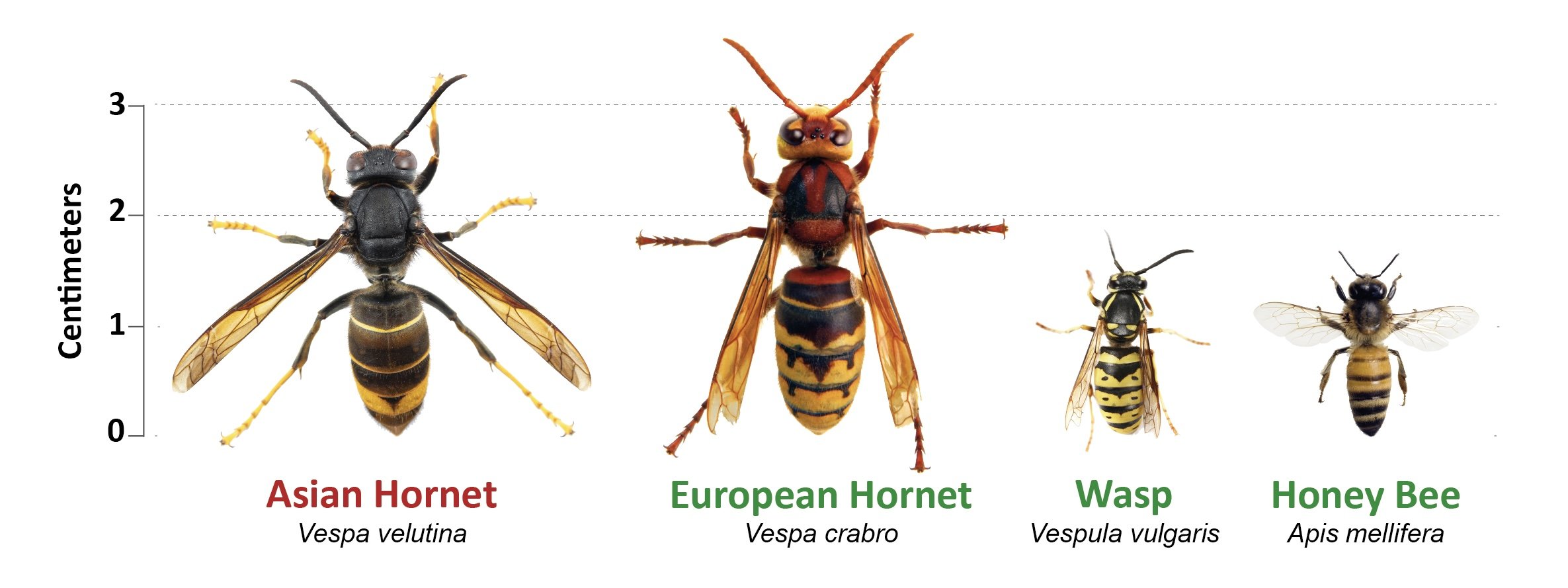You have most probably heard about the Asian Hornet in the media recently. Scientifically known as Vespa Velutina and also referred to as the Yellow Legged Hornet, The Asian Hornet, has become a growing concern in England in recent years.
Originally from Asia, these invasive insects have already established in much of Europe, and now the UK is also under threat from the species.
Asian hornets pose a serious threat to the biodiversity of our natural ecosystems. Preying on our native insects, in particular honeybees, which are vital pollinators for many of the crops that we depend upon for food and also the crucial role they play in our natural ecosystem. Their presence can lead to the decimation of bee populations, leading to significant ecological and economic impacts. Their sting can also be dangerous to humans, particularly those who may be allergic.
Previously, hibernating Asian Hornet Queens are believed to have come to the UK, on ships, boats and Lorries. These Asian Hornet Queens have then established colonies here in the UK. In 2023, it is also likely that an easterly wind assisted many Asian Hornet Queens make the short journey across the channel from France, explaining the large amount of sightings that occurred on the Kent Coast. 2023 saw more nests found and destroyed, than all the other years proceeding it put together, sparking concern that the Asian hornets may have started to establish here in the UK.
What can you do to help in the fight against asian hornets?
To help stop the spread of Asian hornets in England, the public can take several proactive measures:
Be vigilant and observant: Learn to identify Asian hornets and tell them apart from our native European hornet and other similar looking insects. Contrary to popular belief, Asian hornets are actually slightly smaller than our native European hornet, with a distinctive yellow or orange band on the fourth segment of their abdomen. [See diagram below] However; Asian Queens hornets, which will only be spotted in Spring and possibly Autumn may appear to be bigger, since the Queens are larger than worker Asian hornets. The best place for you to keep your eyes open, is in your garden [on flowering plants and fruits] but also keep your eyes peeled when you are out and about, as expansive areas, such as National Parks and farmland do not have many human inhabitants to keep a watch out.
European hornet.
Larger than Asian hornets
Head yellow from front and red from above
Abdomen mostly pale yellow with black stripes
Thorax and legs black/ reddish brown
Overall rusty orange appearance
Asian hornet.
Smaller than native hornets
Orange head (from front)
Abdomen almost entirely dark, with fine yellow stripes and a yellow or orange 4th segment near the base
Black or brown thorax
Legs with yellow tips
Report sightings: There are a number of ways you can report sightings of Asian Hornets. The best and most useful tool, to report sightings and to ensure correct identification, is the Asian hornet app available for your phone: Click here for i-phone and click here for android.
Sightings can also be lodged using this form. Click here. or you can email sightings [preferably with a photo included] to: alertnonnative@ceh.ac.uk.
Garden Traps: The use of traps in your garden, where they can be regularly monitored, can be an effective way of both, monitoring and capturing Asian hornets. Care should be taken not to trap native insects including our protected native, European Hornet. There are severeal traps available. This useful and affordable trap is available from Mêl Gwenyn Gruffydd Honey Click here to purchase.
Spread awareness: Educate others about the threat posed by Asian hornets and how to identify them. Increasing public awareness can lead to more sightings being reported and better control measures being implemented.
Support eradication efforts: If Asian hornets are spotted in your area, cooperate with local authorities and professionals to eradicate them safely and effectively.
The Asian Hornet. With a combined effort from the National Bee unit, beekeepers and the general public we may be able defeat the Asian Hornet, or at the very least, keep them to a non-devastating level.
We hope you find this information useful and straight forward, so you can do your bit, in the fight against this invasive insect.
There is also lots of very useful information regarding the Asian Hornet to be found on the National Bee Unit’s website by clicking here.





